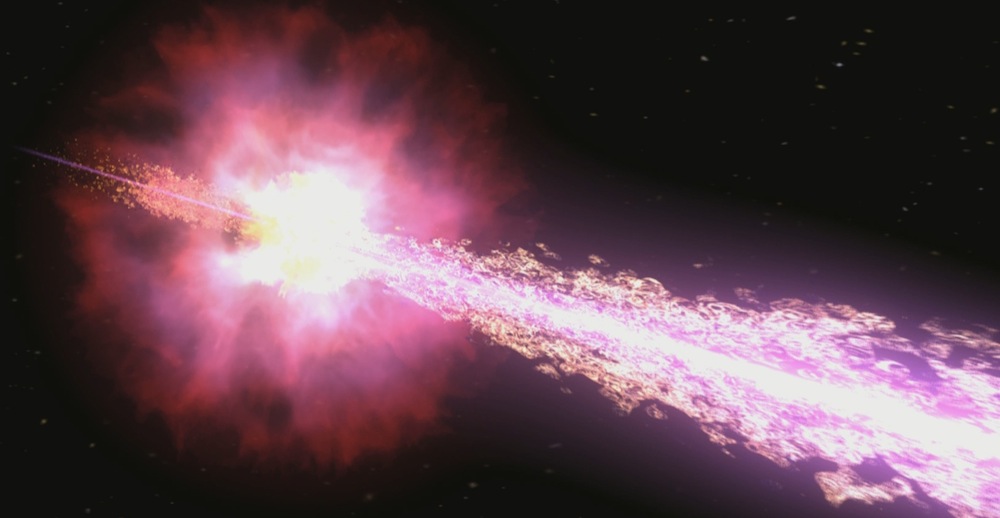Jeff - As I've been saying, the Fukushima-caused Arctic ozone
hole is enabling all sorts of electro-atmospheric effects. There is no
blackened burnt grass in the photo. This is not normal cloud generated
lightning, but more like a cosmic storm. If this continues, there goes
the atmosphere and the Earth's electromagnetic shield. Same electro-atmospheric
effects killed thousands of saiga deer in Siberia.
More Than 300 Reindeer Killed By Lightning In Norway

Some 323 wild reindeer lie dead after being struck by
lightning on a hill side on Hardangervidda mountain
plateau in southern Norway on August 27, 2016 (AFP Photo/Haavard Kjontvedt)
AFP•August 29, 2016
Some 323 wild reindeer lie dead after being struck by lightning on a hill
side on Hardangervidda mountain plateau in southern Norway on August 27,
2016
Oslo (AFP) - More than 300 wild reindeer have been killed by lightning
in southern Norway, officials said Monday, in the largest such incident
known to date.
The 323 reindeer, including 70 young, were found on Friday by a gamekeeper
on the Hardangervidda plateau, a national park where Europe's largest
herd of some 10,000 wild reindeer roam freely.
Television footage showed the animals' dead bodies lying close together
on the ground.
"There were very strong storms in the area on Friday. The animals stay
close together in bad weather and these ones were hit by lightning," an
official from the Norwegian Environment Agency, Kjartan Knutsen, told
AFP.
Reindeer are social creatures and usually move in packs. "It's unusual.
We've never seen anything like this on this scale," Knutsen said.
Norwegian authorities have yet to decide what to do with the animals.
"We're going to decide soon whether to let nature run its own course or
whether we will do something," he said.
Of the 323 reindeer killed, five had to be put down due to their injuries.
Thee are some 25,000 wild tundra reindeer in Norway, located in the southern
mountain ranges, according to experts. -AFP
Yoichi continues…
The reindeer deaths look to be an electro-shock, high energy but without
conversion to heat (thermal power). The electric force is high but efficiently
transferred between the atmosphere to the ground, and not a rebalancing
or equalization of current between ground and air.
It could be called 'cold lightning' but it is not actually lighting from
electrons moving in a vapor column. The air is dry, and so it is a jolt
of energy from the upper atmosphere (like a sprite or a jet) moving down
to the ground, caused by ionization of atmospheric gas atoms by gamma
radiation.
It would be very serious if the phenomena is even more directly caused
by radioactivity as a "gamma burst" - the death ray of sci-fi.
This could be at a relatively small scale a gamma ray burst when concentrations
of radioactive isotopes in the atmosphere are bombarded by solar and cosmic
radiation (Northern Lights). Here is an article that will
further explain...
Did Deadly Gamma-Ray Burst Cause A Mass Extinction On Earth?
By Charles Q. Choi
Live Science Contributor
December 8, 2014

In this illustration, a jet is produced by an unusually bright gamma-ray
burst.
Credit: NASA/Swift/Cruz deWilde
A gamma-ray burst, the most powerful kind of explosion known in the universe,
may have triggered a mass extinction on Earth within the past billion
years, researchers say.
These deadly outbursts could help explain the so-called Fermi paradox,
the seeming contradiction between the high chance of alien life and the
lack of evidence for it, scientists added.
Gamma-ray bursts are brief, intense explosions of high-frequency electromagnetic
radiation. These outbursts give off as much energy as the sun during its
entire 10-billion-year lifetime in anywhere from milliseconds to minutes.
Scientists think gamma-ray bursts may be caused by giant exploding stars
known as hypernovas, or by collisions between pairs of dead stars known
as neutron stars. [Top 10 Greatest Explosions Ever] http://www.livescience.com/13201-top-10-greatest-explosions-chernobyl-supernova.html
If a gamma-ray burst exploded within the Milky Way, it could wreak extraordinary
havoc if it were pointed directly at Earth, even from thousands of light-years
away. Although gamma rays would not penetrate Earth's atmosphere well
enough to burn the ground, they would chemically damage the atmosphere,
depleting the ozone layer that protects the planet from damaging ultraviolet
rays that could trigger mass extinctions. It's also possible that gamma-ray
bursts may spew out cosmic rays, which are high-energy particles that
may create an experience similar to a nuclear explosion for those on the
side of the Earth facing the explosion, causing radiation sickness.
To see how great a threat gamma-ray bursts might pose to Earth, researchers
investigated how likely it was that such an explosion could have inflicted
damage on the planet in the past.
Gamma-ray bursts are traditionally divided into two groups — long and
short — depending on whether they last more or less than 2 seconds. Long
gamma-ray bursts are associated with the deaths of massive stars, while
short gamma-ray bursts are most likely caused by the mergers of neutron
stars.
For the most part, long gamma-ray bursts happen in galaxies very different
from the Milky Way — dwarf galaxies low in any element heavier than hydrogen
and helium. Any long gamma-ray bursts in the Milky Way will likely be
confined in regions of the galaxy that are similarly low in any element
heavier than hydrogen and helium, the researchers said.
The scientists discovered the chance that a long gamma-ray burst could
trigger mass extinctions on Earth was 50 percent in the past 500 million
years, 60 percent in the past 1 billion years, and more than 90 percent
in the past 5 billion years. For comparison, the solar system is about
4.6 billion years old.
Short gamma-ray bursts happen about five times more often than long ones.
However, since these shorter bursts are weaker, the researchers found
they had negligible life-threatening effects on Earth. They also calculated
that gamma-ray bursts from galaxies outside the Milky Way probably pose
no threat to Earth.
These findings suggest that a nearby gamma-ray burst may have caused one
of the five greatest mass extinctions on Earth, such as the Ordovician
extinction that occurred 440 million years ago. The Ordovician extinction
was the earliest of the so-called Big Five extinction events, and is thought
by many to be the second largest.
|

